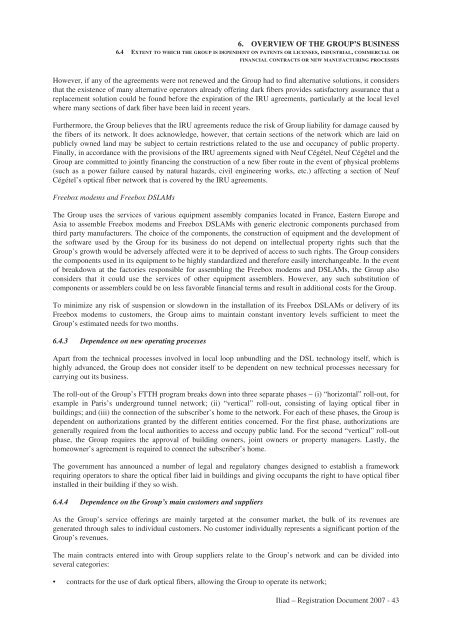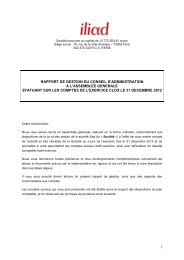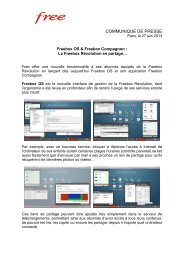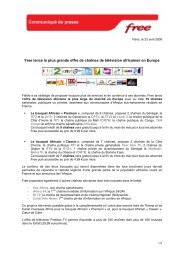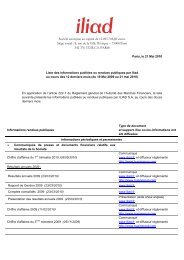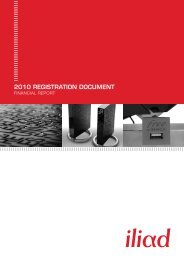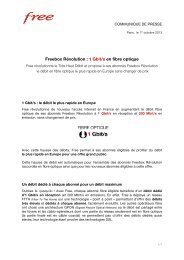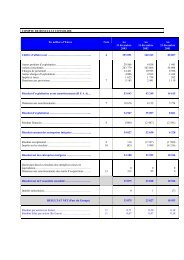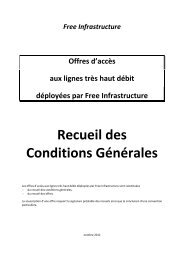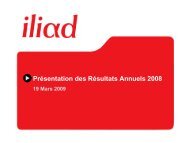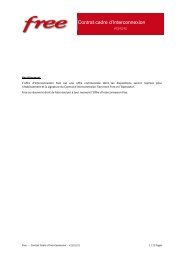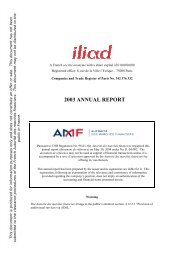REGISTRATION DOCUMENT AND FINANCIAL REPORT - Iliad
REGISTRATION DOCUMENT AND FINANCIAL REPORT - Iliad
REGISTRATION DOCUMENT AND FINANCIAL REPORT - Iliad
- TAGS
- registration
- iliad
- iliad.fr
Create successful ePaper yourself
Turn your PDF publications into a flip-book with our unique Google optimized e-Paper software.
6. OVERVIEW OF THE GROUP’S BUSINESS<br />
6.4 EXTENT TO WHICH THE GROUP IS DEPENDENT ON PATENTS OR LICENSES, INDUSTRIAL, COMMERCIAL OR<br />
<strong>FINANCIAL</strong> CONTRACTS OR NEW MANUFACTURING PROCESSES<br />
However, if any of the agreements were not renewed and the Group had to find alternative solutions, it considers<br />
that the existence of many alternative operators already offering dark fibers provides satisfactory assurance that a<br />
replacement solution could be found before the expiration of the IRU agreements, particularly at the local level<br />
where many sections of dark fiber have been laid in recent years.<br />
Furthermore, the Group believes that the IRU agreements reduce the risk of Group liability for damage caused by<br />
the fibers of its network. It does acknowledge, however, that certain sections of the network which are laid on<br />
publicly owned land may be subject to certain restrictions related to the use and occupancy of public property.<br />
Finally, in accordance with the provisions of the IRU agreements signed with Neuf Cégétel, Neuf Cégétel and the<br />
Group are committed to jointly financing the construction of a new fiber route in the event of physical problems<br />
(such as a power failure caused by natural hazards, civil engineering works, etc.) affecting a section of Neuf<br />
Cégétel’s optical fiber network that is covered by the IRU agreements.<br />
Freebox modems and Freebox DSLAMs<br />
The Group uses the services of various equipment assembly companies located in France, Eastern Europe and<br />
Asia to assemble Freebox modems and Freebox DSLAMs with generic electronic components purchased from<br />
third party manufacturers. The choice of the components, the construction of equipment and the development of<br />
the software used by the Group for its business do not depend on intellectual property rights such that the<br />
Group’s growth would be adversely affected were it to be deprived of access to such rights. The Group considers<br />
the components used in its equipment to be highly standardized and therefore easily interchangeable. In the event<br />
of breakdown at the factories responsible for assembling the Freebox modems and DSLAMs, the Group also<br />
considers that it could use the services of other equipment assemblers. However, any such substitution of<br />
components or assemblers could be on less favorable financial terms and result in additional costs for the Group.<br />
To minimize any risk of suspension or slowdown in the installation of its Freebox DSLAMs or delivery of its<br />
Freebox modems to customers, the Group aims to maintain constant inventory levels sufficient to meet the<br />
Group’s estimated needs for two months.<br />
6.4.3 Dependence on new operating processes<br />
Apart from the technical processes involved in local loop unbundling and the DSL technology itself, which is<br />
highly advanced, the Group does not consider itself to be dependent on new technical processes necessary for<br />
carrying out its business.<br />
The roll-out of the Group’s FTTH program breaks down into three separate phases – (i) “horizontal” roll-out, for<br />
example in Paris’s underground tunnel network; (ii) “vertical” roll-out, consisting of laying optical fiber in<br />
buildings; and (iii) the connection of the subscriber’s home to the network. For each of these phases, the Group is<br />
dependent on authorizations granted by the different entities concerned. For the first phase, authorizations are<br />
generally required from the local authorities to access and occupy public land. For the second “vertical” roll-out<br />
phase, the Group requires the approval of building owners, joint owners or property managers. Lastly, the<br />
homeowner’s agreement is required to connect the subscriber’s home.<br />
The government has announced a number of legal and regulatory changes designed to establish a framework<br />
requiring operators to share the optical fiber laid in buildings and giving occupants the right to have optical fiber<br />
installed in their building if they so wish.<br />
6.4.4 Dependence on the Group’s main customers and suppliers<br />
As the Group’s service offerings are mainly targeted at the consumer market, the bulk of its revenues are<br />
generated through sales to individual customers. No customer individually represents a significant portion of the<br />
Group’s revenues.<br />
The main contracts entered into with Group suppliers relate to the Group’s network and can be divided into<br />
several categories:<br />
• contracts for the use of dark optical fibers, allowing the Group to operate its network;<br />
<strong>Iliad</strong> – Registration Document 2007 - 43


